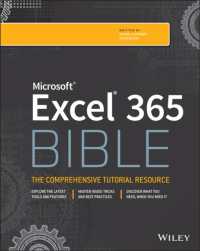- ホーム
- > 洋書
- > ドイツ書
- > Social Sciences, Jurisprudence & Economy
- > Education Science / Pedagogic
- > didactics, methodics, school education
Full Description
This fourth international handbook discusses developments not recognized or dealt with fully in the first three Springer Mathematics Education handbooks and tackles controversial issues in the field. After starting with a provocative introductory chapter which asks whether controversy is a healthy feature of international mathematics education, the four following sections cover: (a) mathematics education in Asia; (b) the roles of theory in research and practice; (c) equity and social justice; and (d) curriculum and change. These themes are taken up in 28 chapters by 60 authoritative authors from all continents. Each of the four sections is structured on the basis of past, present, and future aspects.
Like the first three mathematics education handbooks, this handbook provides a very valuable resource for teachers, mathematics education practitioners and researchers, education policy makers, and mathematicians, as well as graduate and undergraduate students.
Contents
Emeritus Professor M. A. (Ken) CLEMENTS: Can Controversy be a Healthy Feature of International Mathematics Education.- Section A: Mathematics Education in Asia.- Professor Berinderjeet KAUR: Section Editor's Introduction to Section A of the Handbook.- David Lindsay ROBERTS, Catherine VISTRO-YU, Rakhi BANERJEE: Mathematics Education in Asia -Curriculum and its origins.- Yew Hoong LEONG, Oh Nam KWON, & Keiko HINO: Myths and realities: Teaching and learning of maths in high achieving East Asian countries.- Wee Tong SEAH, WANG Ting Ying: East Asian students' mathematics performance: A values-based macro-education perspective.- ZHU YAN, & Markku HANNULA, CHOI Ban Heng: Affect and achievement in mathematics of students in Asian countries: Findings from TIMSS and PISA..- Gabriele KAISER, Xinrong YANG: Affect and achievement in mathematics of students in Asian countries: Findings from TIMSS and PISA Comparative Studies.- Jinfa CAI, Anne WATSON, Binyan XU: Beyond the Asian/Eastern and Western Traditions of Mathematics Education.- Section B: Role of Theory in Research and Practice.- Professor Thomas LOWRIE: Section Editor's Introduction to Section A of the Handbook.- Nerida Fay ELLERTON, and Florence Mihaela SINGER: Relating Theory and Practice in Mathematics Education: A Historical Overview.- Nathalie SINCLAIR, Patricio HERBST: Philosophy and Mathematics Education.- Julie SARAMA, Ilyse RESNICK, Mike STIEFF: The Impact of Classroom-Based Interventions on Theory Building.- Zachary HAWES, Ajay RAMFUL: The Role and Nature of Fidelity in Theory-Practice Advancement.- Peter GROOTENBOER, Elham KAZEMI, Bam Heng CHOI: Practice(s) as a Form of Theory.- Susanne PREDIGER, Kara JACKSON, Boris KOICHU: Beyond the Theory-Practice Continuum in Mathematics Education.- Section C: Equity and Social Justice.- Professor Vilma MESA: Section Editor's Introduction to Section B of the Handbook.- Tamsyn MEANEY David WAGNER: Invisibilization and Intersectionality in Mathematics Education: A Historical Overview.- Ebony McGEE, Elnat HEYD METZUYANI, Greg LARNELL: Changing Perspectives on Mathematical Identity.- Luis LEYVA, Felicia JAREMUS: New Understandings of Gender in Mathematics Education.- Luis VALOYES-CHAVEZ, Maria LÜSSENHOP, Stephen REDER: Mathematical Education for Students in//Victims of Conflict Zones.- Megan NICKELS, Craig CULLEN: Mathematics and Students with Chronic Illness,: Physical or Mental Differences.- Maisie GHOLSON, Catherey YEH: Where to from Here? Reflections on Theorizations, Methods and Advocacy.- Section D: Curriculum Issues.- Associate Professor Johan PRYTZ: Section Editor's Introduction to Section D of the Handbook.- Kristin BJARNADOTTIR, & Dirk DE BOCK, Joäo BOSCO PITOMBEIRO DE CARVELHO: History—The Origin of the Concept of Mathematics Curriculum.- Janine REMILLARD, Sebastian REZAT: Textbooks and Curriculum—The Role of Textbooks and Digitalization in a Governance Perspective.- Andreas RYVE, Paul COBB, Ian WESTBURY: Professional Development Projects as Drivers of Changes in Mathematics Curriculum—Do They Work?.- Anita RAMPAL, Anna TSATSARONI: Is a Transnational Mathematics Curriculum Desirable?.- Alyse SCHNEIDER, & Lieven VERSCHAFFEL, Paola VALERO: Teaching Methods and the Curriculum: On the Socio-Political Location of Pedagogical Research.- Paul DRIJVERS, Luc TROUCHE, Kaye STACEY: Future policy Issues Regarding Mathematics Curriculum (with a Special Focus on Digital Technology).








